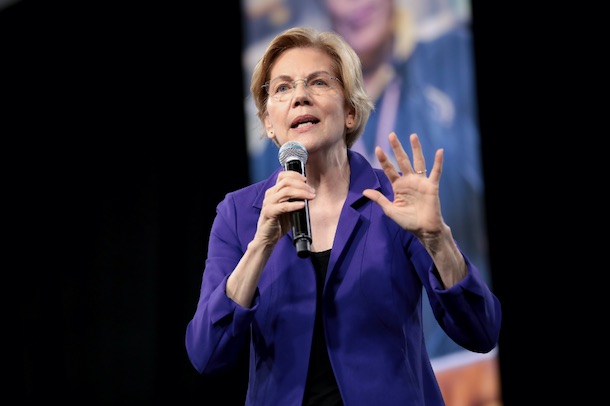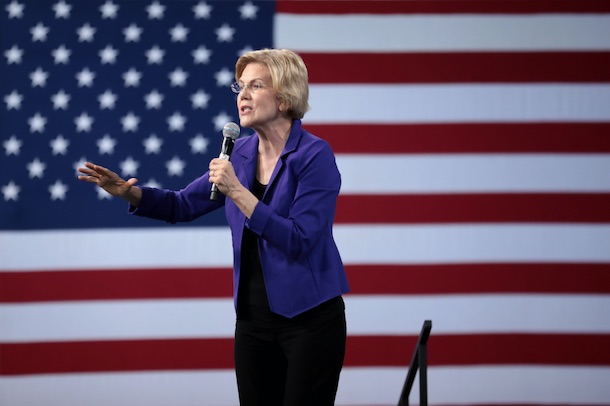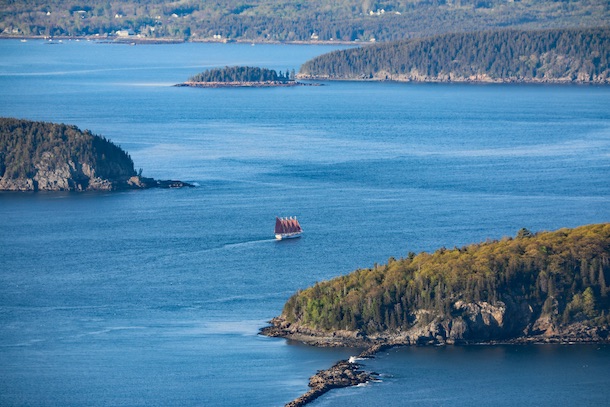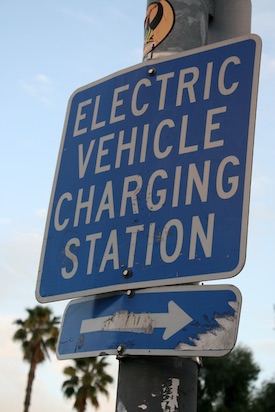Elizabeth Warren’s Climate Plan
Air Date: Week of February 28, 2020

Elizabeth Warren updated her climate plan by incorporating aspects of the plan espoused by Jay Inslee, another of the Democratic presidential candidates, who ran on a platform of climate action. (Photo: Gage Skidmore, Flickr, CC BY-SA 2.0)
From healthcare to climate change, Elizabeth Warren has a plan for that. Living On Earth’s Jenni Doering reports on Elizabeth Warren’s $11 trillion climate platform, including plans for a Green New Deal, environmental justice, and ocean health, as voters weigh in on climate change as an election priority.
Transcript
CURWOOD: It’s Living on Earth, I’m Steve Curwood.
Democratic presidential hopeful Elizabeth Warren has an 11 trillion dollar strategic plan for tackling climate change. But time is running out for the Massachusetts Senator to capture delegates in the 2020 primary season. Living on Earth’s Jenni Doering details Senator Warren's Green New Deal.
[CHEERS]
WARREN: I got a plan for that!
[CHEERS]
DOERING: Elizabeth Warren’s campaign has been built on that mantra.
And one of her boldest, though hardly the most expensive, is her $11 trillion plan for addressing climate change. Here she is at CNN’s town hall on the climate crisis in September 2019.
WARREN: Climate change is real, it is manmade, and we are running out of runway to be able to fix this problem. We need all hands on deck on this one.
DOERING: “All hands on deck” means her Green New Deal for rapidly decarbonizing the US economy. At the heart of Senator Warren’s version is a pledge to reach one hundred percent clean, renewable, and zero-emission electricity by 2035.
She’s also calling for a “Blue New Deal”, to revitalize fisheries, green ports, and expand marine protected areas. And Elizabeth Warren says that her Green New Deal presents an opportunity to address and end the long, devastating legacy of environmental racism. Here she is at the Democratic debate in Nevada on February 19th.
WARREN: I want to make sure that the question of environmental justice gets more than a glancing blow in this debate, because, for generations now in this country, toxic waste dumps, polluting factories, have been located in or near communities of color over and over and over. And the consequences are felt in the health of young African American babies, felt in the health of seniors, people with compromised immune systems. It's also felt economically. Who wants to move into an area where the air smells bad or you can't drink the water? I have a commitment of a trillion dollars to repair the damage that this nation has permitted to inflict on communities of color for generations now.
DOERING: Among the presidential candidates, Senator Warren is one of the most vocal about environmental justice, and in November of 2019, she spoke about addressing longstanding injustice at the first-ever presidential forum on environmental justice.
And of course, she has a plan for that.

Elizabeth Warren speaking in 2019 at the National Forum on Wages and Working People in Las Vegas, Nevada. (Photo: Gage Skidmore, Flickr, CC BY-SA 2.0)
WARREN: So, we will have a Council on Environmental Justice. And in my first hundred days, we will bring together the groups that have been trying to cope with environmental justice for generation after generation and say, Let’s lay out a plan for how to spend that money. Let’s layout a plan for how to lift up the communities that have been left behind. Let’s make a plan together for big structural change.
DOERING: All the Democratic presidential candidates currently serving in Congress are co-sponsoring the Green New Deal resolution introduced to the House and Senate. Elizabeth Warren’s version of a Green New Deal incorporates the plan put forth by Washington Governor Jay Inslee, a Democrat who ran for president on a climate-centric platform before dropping out of the race in August 2019. Although Senator Warren’s plan has a hefty $11 trillion price tag of both public and private financing, she says it promises to give a major boost to the economy.
WARREN: There's an upcoming $27 trillion market worldwide for green and much of what is needed has not yet been invented. My proposal is let's invent it here in the United States. And then say we invent it in the US, you've got to build it in the US.
DOERING: But even as she calls for harnessing the American labor force for a Green New Deal, Senator Warren says that in order to decarbonize the US economy, most of another major American resource, its oil, gas and coal reserves, will need to be left in the ground. At the Nevada debate, Elizabeth Warren said she’s willing to use the power of the presidency to that end.
WARREN: I think we should stop all new drilling and mining on public lands and all offshore drilling if we need to make exceptions because there are specific minerals that we've got to have access to, that we locate those, and we do it not in a way that just is about the profits of giant industries, but in a way that is sustainable for the environment. We cannot continue to let our public lands be used for profits by those who don't care about our environment and are not making it better.

Elizabeth Warren’s Blue New Deal looks to restore coastal fisheries through regenerative ocean farming, expand offshore wind and marine protected areas, and restore coastal ecosystems for carbon sequestration. (Photo: Michael Weidner, Unsplash, public domain)
DOERING: Senator Warren calls herself a staunch capitalist. Nevertheless, from the debate stage, she called out corporations that have far too much power in politics.
WARREN: Why can't we get anything passed in Washington on climate? Everyone understands the urgency, but we've got two problems. The first is corruption, an industry that makes its money felt all through Washington. The first thing I want to do in Washington is passing my anti-corruption bill so that we can start making the changes we need to make on climate and the second is the filibuster. If you're not willing to roll back the filibuster, then you're giving the fossil fuel industry a veto.
DOERING: That’s what happened back in 2009 when the House passed the Waxman-Markey cap and trade bill. It would have been a major step towards the US curbing its carbon emissions. A majority of Senators appeared to support the bill, and the Democrats were just one seat short of a filibuster-proof majority. But thanks to the filibuster threat, the bill quietly died before even reaching the Senate floor. And by the way, when Elizabeth Warren was elected to the Senate shortly thereafter, she unseated Republican Scott Brown, who had given the GOP that 41st seat needed to filibuster.
[APPLAUSE, MUSIC]
WARREN: Hello Keene!
DOERING: At a New Hampshire town hall, Senator Warren said the way the federal government is operating has dire consequences for the average American.
WARREN: It is a government that works great for giant oil companies that want to drill everywhere, just not for the rest of us who see climate change bearing down upon us. // And if we want to fix this, we can’t just nibble around the edges. If we want our democracy to work again, it’s gonna take some big structural change, and that’s why I’m here. Big Structural Change.
[APPLAUSE, CHEERS]
DOERING: On New Hampshire’s primary election eve, Elizabeth Warren held another town hall at South Church in Portsmouth.
[APPLAUSE, CHEERS]
DOERING: Voters gathered there expressed confidence in Senator Warren’s ability to get climate action done.

Senator Warren’s climate plan includes 100% renewable electricity generation, and the proliferation of electric vehicles to use that energy, by 2035. (Photo: Quinn Dombrowski, Flickr, CC BY-SA 2.0)
VOTER 1: It’s certainly got to be the main issue of our time, right? I mean, if we have no planet, does it really matter who we elect? So, I know, she’s been on board for the Green Deal for a long long time since it came out, and that also was a big factor for me.
VOTER 2: I’m a scientist, myself, an astronomer, and we’ve got maybe ten years to save the planet, basically. And I know she has a plan for climate change, and how we’ll address that. It’s vital, I’m becoming somewhat desperate and of course, it’s not my generation that’s gonna deal with the brunt of this, it’s those who come after us.
DOERING: One 14-year-old member of that next generation who attended the town hall is still too young to vote, but already passionate about climate policy.
KID: Climate change really bothers me, and I, like, I don’t want to be underwater by the time I’m my parents’ age; I want to be able to live without worrying about animals going extinct and cities flooding.
DOERING: The outcome of the 2020 Presidential election will either cement those fears further or give the world a chance at changing course on climate change. The Warren campaign is making a case that she’s the best person to lead the Democratic Party, and the country, into that uncertain future.
For Living on Earth, I’m Jenni Doering.
This story was produced with the help of Isaac Merson.
Links
Click here to read Elizabeth Warren’s Climate Plans
Inside Climate News | "Elizabeth Warren on Climate Change: Where the Candidate Stands"
Living on Earth wants to hear from you!
Living on Earth
62 Calef Highway, Suite 212
Lee, NH 03861
Telephone: 617-287-4121
E-mail: comments@loe.org
Newsletter [Click here]
Donate to Living on Earth!
Living on Earth is an independent media program and relies entirely on contributions from listeners and institutions supporting public service. Please donate now to preserve an independent environmental voice.
NewsletterLiving on Earth offers a weekly delivery of the show's rundown to your mailbox. Sign up for our newsletter today!
 Sailors For The Sea: Be the change you want to sea.
Sailors For The Sea: Be the change you want to sea.
 The Grantham Foundation for the Protection of the Environment: Committed to protecting and improving the health of the global environment.
The Grantham Foundation for the Protection of the Environment: Committed to protecting and improving the health of the global environment.
 Contribute to Living on Earth and receive, as our gift to you, an archival print of one of Mark Seth Lender's extraordinary wildlife photographs. Follow the link to see Mark's current collection of photographs.
Contribute to Living on Earth and receive, as our gift to you, an archival print of one of Mark Seth Lender's extraordinary wildlife photographs. Follow the link to see Mark's current collection of photographs.
 Buy a signed copy of Mark Seth Lender's book Smeagull the Seagull & support Living on Earth
Buy a signed copy of Mark Seth Lender's book Smeagull the Seagull & support Living on Earth

